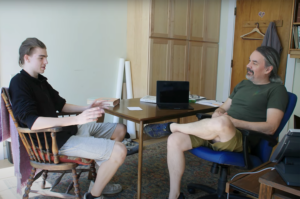
At Putney, “we learn by doing.”
The mantra is baked into every assignment and class discussion; every Project Week and work job and leadership role. As students navigate their life on campus, they are constantly challenged to find a unique purpose through trial, insight and reflection.
“It’s about understanding yourself and your motivations for doing things, and how you experience learning,” said Kevin Champney, who serves as director of technology and library services, co-academic dean, history and humanities teacher, and writing and research teacher at The Putney School. “The significant difference between the way you would experience a classroom at a traditional school, versus the way you experience progressive education, is that you’re actually reflecting on your learning regularly … and it’s hard to get kids to reflect regularly when they’re 15 years old.”
Enter Lumi, an AI-powered chatbot being developed by Boston College researchers. Described as a reflective intelligence co-pilot, it aims to help people discover their purpose. Users type in their ideas and questions, and Lumi delivers thought-provoking responses that evolve into a conversation designed to clarify an intentional path forward.
Lumi for Putney
The tool is currently in a beta phase, and project lead and licensed certified social worker Tim Klein has teamed up with Champney to enlist The Putney School as one of the few hand-selected entities to test it out.
The program includes two apps that work together — Lumi for Reflection, which focuses on gathering insight from past experiences, and Lumi for Intention, which focuses on figuring out the next steps to take in the future.
“In a perfect world, we’re creating these cycles where people are setting meaningful intentions, they’re attempting to act on those intentions, and they are taking time to gather insights on the impact that their actions or inactions are having,” Klein said. “And those insights are then informing future intentions that they’re making.”
He and his team developed a Putney-specific pilot version of Lumi, which Champney has introduced to students primarily during Project Weeks, and to those working on senior exhibitions. Klein said he chose Putney because the school’s progressive methods are essentially proof of concept for the type of learning Lumi promotes.
Putney really embodies student-centered, self-directed learning, and so Lumi is this co-pilot to help them explore what they want to have happen,” Klein said.
Purposeful & Practical

Champney said it’s been particularly useful with students who are struggling to find their path, and benefit from guidance as to how to proceed.
“What should I do now? What can I accomplish in the next half hour? What am I going to accomplish this week? It’s great at that sort of thing,” Champney said. “It will give you really concrete steps.”
It’s also a way to encourage students to figure things out for themselves ahead of time, so when they meet with advisors they have a solid jumping off point.
“We have so much independent work here so if a student comes to an adult and says, ‘here’s where I am,’ it’s way more valuable than them coming to you and saying, ‘I have no idea where to go right now.’ You can get a lot further faster that way,” Champney said.
Lumi is also effective at scaling that counseling element among a large group.
“If I have 15 students all doing independent projects, I could spend 45 minutes with each of them to get them to a place where they have a project plan,” Champney said. “Or I could have those 15 students go through that process in 45 minutes with Lumi, and then sit with me for five minutes and explain to me what the plan is going to be.”
Now imagine a similar scenario at a high school with only two guidance counselors, and 500 seniors all trying to figure out what to do after they graduate. Will they go to college? Join the army? Become an electrician? Travel to Europe?
“A challenge is that no one feels like they have enough time to go deep on these bigger questions with students,” said Klein, speaking from experience as a former college counselor. “College counselors have really big caseloads. And so this is a place where technology can be really helpful as an additional reflective space for students to be thinking about this.”
Both he and Champney are acutely aware of the moral implications of such a tool.
The technology is changing all the time, and it’s so new and emerging,” Klein said. “We want to do this thoughtfully and deliberately, and make sure we’re being really intentional about it.”
He wants to ensure Lumi is not treated as a replacement for human-to-human connection. Quite the opposite, Klein envisions people having deeper, more meaningful conversations because of it, and thinking more critically about themselves, their lives, and who they want to be.
“The thing the Lumi app does really well is it disarms you,” Champney said. Take, for instance, a Putney student using it to reflect on building a skateboard for Project Week.
“And it will say, ‘wow, that’s really cool. What was your motivation for wanting to build a skateboard?’ And you’ll say, ‘well I love skateboarding.’ But it will actually walk you through a process — it does a sort of sense memory thing saying what were you feeling? What were you smelling? And then it gets to a point where you can say oh, you know what? The thing I learned wasn’t actually how to laminate wood. It was persistence.”
Whether it’s an intention to grow a garden, plan a family vacation, explore a new career path, or set a 10-year goal, the personal and professional potential is vast. With that in mind, researchers at Boston College are currently working with a handful of select organizations to explore some of the practical uses of Lumi.
“We’re doing these little pilots with the right partners, like Putney, to make sure that we’re doing this in a way where we’re not moving fast and breaking things,” Klein said.
For instance, they’ve launched it as a peer mentoring prototype targeting low-income first generation students at a two-year residential college in Massachusetts, and have partnered with school districts in Connecticut to combat educator burnout and improve their mental health.
“We’re exploring a lot of different territories where we think people and programs could benefit from this,” Klein said. “But we really want the people who are already experts in those fields to be the ones who are deciding how this should be used.”
Understanding the Power of AI
At a time when the use of artificial intelligence in schools often sparks concerns about misinformation, cheating, and plagiarism, he sees Lumi for Putney as a use case to demonstrate to the larger educational landscape how AI can be applied in a radically different way.
We see Putney as a world-class leader in project-based learning,” Klein said. “And so we want them to be showing, ‘hey, here’s how you can be implementing reflective intelligence when it comes to project-based learning.’”
Champney plans to continue to leverage Lumi to encourage students to reflect on a more regular basis, especially when it comes to independent learning initiatives and during Project Weeks. He would also like to get a few other teachers to start using it before exploring the possibility of eventually opening it up to the school in a larger, constructive way.
Through it all, he plans to work closely with Klein as AI technology evolves, and researchers continue to develop Lumi in a deliberate and responsible way that aims to leave a positive mark on society.
“I think the point of education is to help people think deeply and be able to reflect deeply on who they are and who they want to be, and the impact that they want to have in the world,” Klein said. “And if Lumi can be a tool that helps people do that, then that’s great.”

